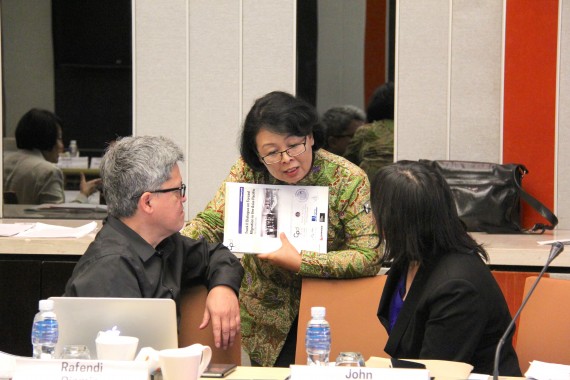Opening new prospects for asylum seekers and refugees in Indonesia and Southeast Asia
Lars Stenger
Jesuit Refugee Service (JRS) has assisted forcibly displaced people in Indonesia since 1999, including people fleeing violence in Timor Leste, Maluku and Aceh. Since 2009 JRS Indonesia has supported asylum seekers and refugees in urban areas and immigration detention centres by listening to their stories and providing information, advice and practical support for the most vulnerable. As Indonesia is a large archipelago, JRS is only able to reach a small number of the 13,500 asylum seekers and refugees registered with UNHCR (United Nations High Commissioner for Refugees).
The main challenges for the protection of asylum seekers and refugees in Indonesia are similar to those in many other countries in the region. Experiences of asylum seekers vary, ranging from feeling welcomed by friendly Indonesians, to being abused and exploited due to their irregular status. Barred from employment, denied access to education and subjected to a very real fear of arrest and indefinite detention, asylum seekers and refugees struggle to survive without documentation or legal status. As a result, asylum seekers and refugees have to rely on the goodwill of authorities and charity from civil society.
Need for change
Although some Indonesians are aware of the huge increase in displaced people around the world, it is often only a personal encounter with a refugee that can challenge unhelpful biases and prejudices too often expressed in the media and by politicians. Once people acknowledge a refugee as a person just like themselves, but in different circumstances, attitudes can be transformed.
On a national level, relevant policy has to be guided by principles of fairness, rights and dignity. Many of asylum seekers and refugees have had traumatic experiences and are in need of special protection and certainty of their status and rights. Policy that clearly acknowledges the humanitarian nature of responses, and is based on the rights that every man, woman and child enjoys, will not only allow authorities to address their needs in an appropriate manner, but also ensure civil society provides appropriate support.
There is a slow shift towards a discussion on how to include responses to forced displacement in a national humanitarian framework for asylum seekers and refugees. Indonesian authorities have opened state-owned support facilities for unaccompanied or homeless displaced children and women who have experienced violence. Much more needs to be done, especially if Indonesia is serious about achieving the Sustainable Development Goals (SDG), adopted at the United Nations in 2015, which explicitly concern migrants, asylum seekers and refugees. Goal 10 sets out a target of facilitating the ‘orderly, safe, regular and responsible migration and mobility of people including through the implementation of planned and well-managed migration policies’.
At the regional level
There are two major mechanisms informing policy development on migration in the region, namely ASEAN and the Bali Process, both of which have been closed to input from civil society and forced migrants themselves. Both have yet to reach the next level of developing regional approaches and instruments in preparedness for and response to forced migration. The Bali Process has made contributions to capacity building in the prevention of trafficking and irregular migration, but it is only very recently that it became more protection sensitive, considering the rights of asylum seekers and refugees. ASEAN has mainly focused on economic development and increased security rather than human rights protection. The weaknesses of both forums in addressing forced migration became clear when both were inactive during events that unfolded in the Andaman Sea in May 2015, in what could be seen a test case for future forced displacement.
Lessons learned from 2015 present an opportunity to work towards a shared long-term strategy that balances national and regional interests and humanitarian needs. A recent meeting of the Track II Asia Dialogue on Forced Migration, which involved government representatives, academics and NGOs, made some suggestions for future arrangements.
First, the establishment of a core contact group in which key individuals communicate and meet about these issues more regularly. This group could develop strategic responses for handling population crises more effectively, including anticipating displacement events and addressing root causes and triggers of displacement such as escalating ethnic/community tensions. Second, in cases of sudden displacement, the creation of a rapid response deployment team to establish support infrastructure immediately, such as first aid, trauma counseling, shelter and registration and referral services. Third, a partnership framework for the care and support of displaced people who are waiting for long-term durable solutions.
Providing protection for forcibly displaced people in Southeast Asia needs clever and compassionate minds. Politicians who want to tackle these questions should be in touch with the realities at field level, with NGOs and with the people who are affected themselves such as refugees and asylum seekers. Future policies can only succeed if we act together to realise practical solutions.
Lars Stenger (larsstenger@jrs.or.id) has been the national information and advocacy officer with JRS Indonesia since 2008 and is a member of the Track II Asia Dialogue on Forced Migration.












